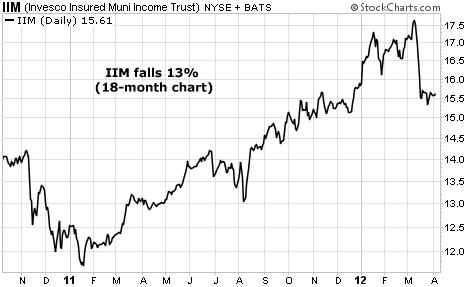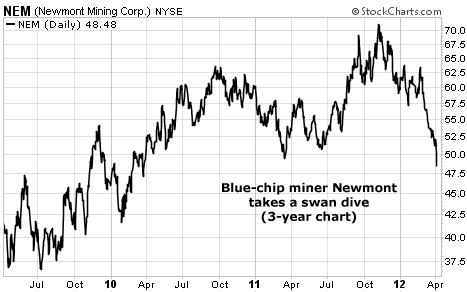| Home | About Us | Resources | Archive | Free Reports | Market Window |
One of My Favorite Income Opportunities Just Got CheaperBy
Thursday, April 5, 2012
Last month, one of the market's best high-income opportunities got a little cheaper.
And if you take action right now, you can earn safe 5% interest... tax-free.
The opportunity is in municipal bonds.
As you may know, municipal bonds are loans made to state and municipal governments. To encourage folks to invest in the government, interest received from "munis" is exempt from federal income tax and, in many cases, state and local income taxes. These bonds are one of the great friends to the income-seeking retiree. And despite some mindless bearish forecasts over the past few years, "munis" have been a terrific income investment.
They still are. And last month, they went on sale...
Back in March, the biggest municipal bond fund and the largest exchange-traded fund tracking municipal bonds fell sharply – losing 1.5% and 2.5%, respectively, in less than three weeks. This may not sound like a big move, but for "boring" bonds, it is...
The decline was the result of a report from Moody's – a credit-rating agency. Moody's said the default rate for municipal bonds has doubled in the past two years relative to the average default rate from 1970 to 2009. The ratings agency also said it expects more local governments to default on bond payments.
I don't pay much attention to what ratings agencies like Moody's have to say. These are the same agencies that gave pristine ratings to the worthless mortgage bonds that helped cause the 2008 credit collapse.
Remember... the municipal bond market is huge... it's over $3 trillion. Since 2010, defaults totaled close to $6.4 billion. The average recovery rate is nearly 70%. Even now, with higher defaults, only 21 have defaulted (compared to 28 this time last year). But most of the bonds are priced as if they're expecting 10%-14% default rates. To put that into perspective, in 2011, defaults totaled $2.8 billion... less than 1% of the total market. So even if defaults doubled (to $5.6 billion), that is still less than 1% of the market... and a long way away from 10%-14%.
I expect prices to rise as the U.S. economy slowly improves. After falling 1.7% in 2009, state personal income rose in 2010 and 2011. And tax revenue has climbed for the past eight quarters. More tax revenue means more secure interest payments and lower default risk. Last month's muni selloff was a huge overreaction by skittish investors.
Also... keep in mind that we saw a similar overreaction back in April 2011. And my Retirement Millionaire subscribers have made a super-safe 23% because of it...
That overreaction was due to banking analyst Meredith Whitney. On 60 Minutes, Whitney claimed the municipal bond market was facing "hundreds of billions of dollars" in defaults. At the time, I wrote...
When Whitney made her prediction, $30 billion exited municipal bond funds in just three months. The biggest muni bond fund is the Vanguard Intermediate-Term Tax-Exempt Fund (VWITX). Shortly after Whitney made her claims about massive defaults, VWITX plunged below $13 a share (from close to $14 a share).
But Meredith Whitney couldn't have been more wrong about munis. In 2011, defaults totaled just $2.6 billion. That's a hair less than the $2.8 billion defaults in 2010 and hardly the disaster industry "experts" were expecting.
And last year, the Barclays Municipal Bond index returned 10.7%, while the S&P 500 only returned 2.1%. And one of my Retirement Millionaire picks – the Invesco Insured Municipal Income Trust (NYSE: IIM) – returned 23%. But earlier this month, after the Moody's report, it fell an absurd 13%.
 Just like last year's overreaction, this one is an opportunity...
Right now, IIM is trading at almost a 3% discount to its net asset value (NAV). This fund is the equivalent to holding a long-dated (15 years to maturity) municipal bond paying around 5% in tax-free interest – which means you're making safe, steady income for years.
The payout is all from real income and is tax-free at 5.82%. That equates to a taxable dividend of almost 9% for those in the top 35% tax bracket. Many other muni funds are offering similar deals.
In summary, many people are scared of the sector... but the numbers and facts just don't support such a stance. And just like last year's muni selloff, this one presents a great buying opportunity for folks seeking retirement income.
Here's to our health, wealth, and a great retirement,
Dr. David Eifrig
Further Reading:
Last year, Doc said that Whitney's muni-bond "doomsday" scenario was overblown. "Everyone's running for the exits just as things are turning up," he wrote. Doc even told readers that muni bonds were the best opportunity they'd see in 2011 for safe, tax-free income. To find out more, click here.
Market NotesEVEN THE BLUE CHIPS ARE GETTING KILLED IN THIS SECTOR Our expected gold stock "rally" is still a gold stock "rout"...
Over the past year, we've written many times how we expected gold stocks to stage a rally. We cited how gold stocks are cheap relative to gold... and cheap relative to 2012 expected earnings. The fact that gold stocks were in a bullish series of "higher highs and higher lows" added another weight to the bullish side of the scales.
Today's chart shows how the scales have tipped in favor of gold-stock bears. Our chart is the past three years trading in blue-chip gold giant Newmont Mining (NYSE: NEM). Newmont is a "top 5" gold producer... and one of the few gold stocks that pays a cash dividend.
Over the past few weeks, Newmont has performed a major "swan dive" to reach a 52-week low. Traders are worried the Fed will eventually raise interest rates... which makes gold less attractive... which results in gold-stock selling.
As we mentioned in this "warning" note, we expect gold prices to trend higher over the coming years. But a trader must always "mind the market." The market is the judge, jury, and executioner of any idea. In this case, the market has dealt gold stocks like Newmont tremendous damage. It will likely be months before we can say this trend is even close to "healthy."
 |
In The Daily Crux
Recent Articles
|


